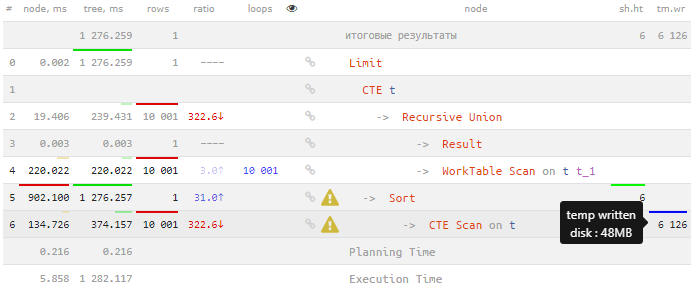A veces, al ejecutar consultas largas o mal escritas en PostgreSQL, suceden varias cosas desagradables, como un bloqueo repentino del proceso o un bloqueo de todo el servidor .
En tales casos, las "almas muertas" pueden permanecer en los archivos multimedia (a veces bastante grandes, pero bastante comparables en tamaño al resto de la base de datos) que se crearon durante el proceso como un almacenamiento temporal de datos intermedios .
Estos datos ya no son necesarios para nadie, no pueden ser utilizados por nadie, pero el servidor todavía no tiene prisa por deshacerse de ellos como Plyushkin.

Hoy veremos cómo se pueden encontrar y "limpiar" sin dolor.
Buscando amortiguadores temporales
La primera categoría de problemas que surgen es el uso temporal del espacio en disco durante la ejecución del nodo del plan, si la cantidad de memoria requerida no cabe en work_mem .
Obtener tal efecto es bastante simple: olvidarse de establecer o elegir un límite de recursión demasiado grande :
explain (analyze, buffers)
WITH RECURSIVE T AS (
SELECT
0 i
, '' s
UNION ALL
SELECT
i + 1
, repeat('a', i + 1)
FROM
T
WHERE
i < 1e4 -- 10k
)
TABLE T ORDER BY s DESC LIMIT 1;

[ explain.tensor.ru]
, T
- , temp written
:
-> CTE Scan on t (actual time=0.008..374.157 rows=10001 loops=1)
Buffers: temp written=6126
, - :
SELECT pg_backend_pid();
-- 15004 - PID ,
explain (analyze, buffers)
WITH RECURSIVE T AS (
SELECT
0 i
, '' s
UNION ALL
SELECT
i + 1
, repeat('a', i + 1)
FROM
T
WHERE
i < 1e5 -- 100k
)
TABLE T ORDER BY s DESC LIMIT 1;
kill -9 15004

- . 4GB - ?
pg_ls_tmpdir:
SELECT * FROM pg_ls_tmpdir();
name | size | modification
pgsql_tmp15004.0 | 1073741824 | 2021-05-12 10:46:10+03
pgsql_tmp15004.1 | 1073741824 | 2021-05-12 10:46:38+03
pgsql_tmp15004.2 | 1073741824 | 2021-05-12 10:47:06+03
pgsql_tmp15004.3 | 958078976 | 2021-05-12 10:47:31+03
PostgreSQL 12, , pg_ls_dir
<data>/base/pgsql_tmp
- , , .
PID , . , , , :
WITH dir AS (
SELECT
current_setting('data_directory') || '/base/pgsql_tmp' dir
)
, ls AS (
SELECT
*
, pg_ls_dir(dir) fn
FROM
dir
)
, tmp AS (
SELECT
*
, regexp_replace(fn, '^pgsql_tmp(\d+).*$', '\1')::integer pid
, (pg_stat_file(dir || '/' || fn)).*
FROM
ls
)
SELECT
dir || '/' || fn
FROM
tmp
LEFT JOIN
pg_stat_activity sa
USING(pid)
WHERE
sa IS NOT DISTINCT FROM NULL;
. , "" pg_terminate_backend(pid)
, "", "" .
TEMPORARY TABLE
CREATE TEMPORARY TABLE x AS
SELECT
i
, repeat('a', i::integer) s
FROM
generate_series(1, 1e5) i;
pg_temp_5
:
SELECT current_schemas(true);
-- {pg_temp_5,pg_catalog,public}
pg_temp
- TABLE x
, TABLE pg_temp.x
TABLE pg_temp_5.x
, .
, "", temp buffers
, pg_class
:
SELECT
oid
, relnamespace::regnamespace
, relname
, relfilenode
FROM
pg_class
WHERE
relnamespace::regnamespace::text ~ '^pg(_toast)?_temp';
oid | relnamespace | relname | relfilenode
66112 | pg_toast_temp_5 | pg_toast_66109 | 66112
66114 | pg_toast_temp_5 | pg_toast_66109_index | 66114
66109 | pg_temp_5 | x | 66109
Tom Lane 2003:
> What is the origin of these schemas? local temporary tables? sorts?
Right, they're made to hold temporary tables. The first time a givenbackend does CREATE TEMP TABLE, it looks for a pg_temp_n schema, and makes it if it's not there. On shutdown, it removes the temp tables, but it seemed like a waste of cycles to remove the pg_temp_n schema itself.
(ObTrivialFact: the 'n' is the backend's pgproc slot number, so it's known not to be in use by any concurrently running backend. But it will certainly be used again in future.)
, . , ?
temp buffers, , , :
WITH dir AS (
SELECT
current_setting('data_directory') || '/base/' || oid dir
FROM
pg_database
WHERE
datname = current_database()
)
, ls AS (
SELECT
*
, pg_ls_dir(dir) fn
FROM
dir
)
SELECT
*
FROM
ls
WHERE
fn ~ '^t';
dir | fn
.../data/base/16393 | t5_66109
.../data/base/16393 | t5_66112
.../data/base/16393 | t5_66114
t<temp schema N>_<temp object OID>
. "" , , pg_class
.
, VACUUM FULL
, , . autovacuum
:
LOG: autovacuum: found orphan temp table "tst.pg_temp_5.x"
, , - .
, "" , , "" :
WITH dir AS (
SELECT
current_setting('data_directory') || '/base/' || oid dir
FROM
pg_database
WHERE
datname = current_database()
)
, ls AS (
SELECT
*
, pg_ls_dir(dir) fn
FROM
dir
)
, lsid AS (
SELECT
*
, (pg_stat_file(dir || '/' || fn)).*
FROM
ls
WHERE
fn ~ '^t'
)
, sch AS (
SELECT DISTINCT
regexp_replace(fn, '^t(\d+)_.*$', '\1') sch
FROM
lsid
WHERE
modification < (
SELECT
stats_reset
FROM
pg_stat_database
WHERE
datid = 0
)
)
SELECT
string_agg('DROP SCHEMA ' || nspname || ' CASCADE;', E'\n') s
FROM
sch
JOIN
pg_namespace nsp
ON nsp.nspname IN ('pg_temp_' || sch, 'pg_toast_temp_' || sch);
, :
DROP SCHEMA pg_temp_5 CASCADE;
DROP SCHEMA pg_toast_temp_5 CASCADE;